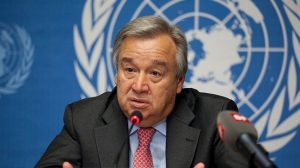Senior UN officials on Tuesday, March 8, 2022, joined women activists, artists, politicians, and others worldwide for an online event to mark the International Women’s Day (IWD), emphasising on gender equality to achieve sustainable development.

IWD is globally marked on March 8 to celebrate the social, economic, cultural, and political achievements of women.
The theme of the celebration is “Gender equality today for a sustainable tomorrow”.
While recognising women’s leadership across all walks of life, UN Secretary-General António Guterres warned that “in too many areas, the clock on women’s rights is moving backwards”, with COVID-19 a prime example.
The crisis has kept girls and women out of classrooms and workplaces, and contributed to rising poverty and violence, among other setbacks.
“We cannot emerge from the pandemic with the clock spinning backwards on gender equality,” Guterres said in a video message. “We need to turn the clock forward on women’s rights. The time is now.”
Progress towards a more gender-equal world is being undermined by multiple interlocking and compounding crises, according to Sima Bahous, Executive Director at UN Women.
“Currently, we are witnessing the horrifying situation in Ukraine where the impacts on women and girls, including the hundreds of thousands displaced, remind us.
“All conflicts, from Ukraine to Myanmar to Afghanistan, from the Sahel to Yemen, exact their highest price from women and girls,” she said.
Meanwhile, climate change and environmental degradation are increasing insecurity, for individuals and countries, with women and girls disproportionately affected.
Bahous said the international community has the chance to put them at the centre of planning and action, and to integrate gender perspective into global and national laws and policies.
“We have the opportunity to re-think, re-frame and re-allocate resources.
“We have the opportunity to benefit from the leadership of women and girls environmental defenders and climate activists to guide our planet’s conservation. We need indigenous women’s inter-generational knowledge, practices and skills,” she said.
The President of the UN General Assembly, Abdulla Shahid, noted that a sustainable future is possible because governments have adopted frameworks such as the Sustainable Development Goals (SDGs), the Paris Agreement on climate change, and the Sendai Framework for Disaster Risk Reduction.
Earlier, he had pointed out how despite their contributions, women remain “under-represented, under-supported, and unrecognised” in the social, economic and political fields needed for sustainable recovery.
“We must strengthen mechanisms that provide pathways and support for ingenuity, ambition, and creativity, from all people who have the skill and the drive.
“We must remove the barriers that prevent women from engaging,” said Shahid.
Next week, the UN Commission on the Status of Women (CSW) begins its annual session, which will also examine gender equality in climate change, environmental, and disaster risk reduction policies and programmes.
“For a sustainable tomorrow, the gendered impacts of climate change must be confronted decisively and urgently,” said Commission Chair, Amb. Mathu Joyini of South Africa.
She underscored commitment towards realising “a robust set of agreed conclusions which will place women and girls firmly at the centre of climate and sustainability solutions.”
By Cecilia Ologunagba
